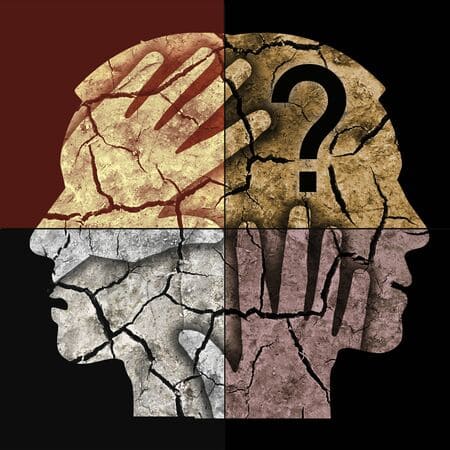Mental Health
What is Schizophrenia?
People with schizophrenia go through acute psychosis and that is, phases in which they perceive the world very differently than they normally do. Unlike post-traumatic stress disorder, they hear voices and feel persecuted or influenced by other people. Their behavior also changes, many speak incoherently. Some almost completely lose touch with reality.
Psychosis usually occurs in temporary phases. Some people experience a psychotic phase only once or a few times. Others have persistent complaints and need a lot of support.
What is the meaning of schizophrenia?
The term schizophrenia means “split mind”. The term is often associated with the idea of a “split personality”. However, this is wrong and promotes prejudice against people with schizophrenia.
Although their perception and behavior are heavily changed at times, they do not have different personalities. In addition, the symptoms, the causes, and the trend of the disease are often very different.
What are the Symptoms of schizophrenia ?
A distinction is made between different forms of schizophrenia, each with typical symptoms. The most common are the following:
- Paranoid schizophrenia: It manifests itself through delusions and hallucinations (typically hearing voices) and the feeling of being watched and influenced by others. It is the most common form and usually begins between the ages of 25 and 35.
- Schizophrenic residual: This form describes chronic complaints that usually occur after an acute psychotic phase. Those affected are then very passive, lacking drive and appear depressed. They have little interest in activities and withdraw socially. Facial expression and language seem emotionless. In addition, it can lead to concentration and memory disorders.
- Hebephrenic schizophrenia: Typical are a conspicuous emotional life with a hardly changeable mood, often not suitable for the situation, erratic thinking and inappropriate behavior. This form usually begins between the ages of 15 and 25 years.
- Catatonic schizophrenia: In this rarer form, abnormal movements such as aimless urge to move, freezing or grimacing are in the foreground. It also usually starts between 15 and 25.
Acute psychosis is often indicated long in advance. In the weeks or months before that, those affected and usually their relatives too, feel that something is changing. Before an acute psychosis, people are often restless, tensed, sleep poorly and have problems concentrating and memory. You may also have mild hallucinations or the feeling that you are being watched and influenced by others.
What are the causes and risk factors of schizophrenia?
The exact causes of schizophrenia have not yet been clarified. Various factors are likely to play a role that can influence one another. We know that some people are at higher risk due to their genetic makeup, especially if a parent or sibling is already suffering from schizophrenia. About 12% of children of mothers or fathers with schizophrenia also develop the disease later.
- Changes in the brain, sleep disorders, drug use, traumatic experiences, developmental disorders in the womb or in childhood can also play a role and favor psychosis.
- Psychosis often occurs in connection with major changes in life, such as separations, relocation or starting a career. The risk factors also include a family atmosphere in which children are much criticized and heavily patronized.
What is the prevalence rate of schizophrenia?
It is estimated that about 1 in 100 people will be diagnosed with schizophrenia at some point in life. Men get sick a little more often than women.
Statistically speaking, people from lower social classes and singles are more likely to develop schizophrenia. However, social decline and loneliness are often also consequences of the illness.
What is the trend of schizophrenia?
The first acute phase of the disease usually occurs between the ages of 15 and 35 years. It is often announced years in advance by increasing complaints that cannot be clearly assigned. These include restlessness, depressed mood, moodiness, self-doubt, fears, or concentration problems. Many suddenly have problems at school or at university, let themselves go outwardly, and withdraw from friends and relatives.

Men experience their first episode a few years earlier than women on average. The cause of this gender difference is unclear. Schizophrenia very rarely begins in childhood.
About a quarter of people have a single episode. About 60 out of 100 people affected, experience a relapse within two years after an initial acute psychosis. Acute psychosis can last weeks to months before it subsides. It often takes some time afterward before it is possible to go about normal everyday life again.
In around a quarter of those affected, the symptoms never completely subside, but instead, slowly increase and then persist permanently. These people often have very severe symptoms that are difficult to treat.
What are the consequences of schizophrenia?
The experience of psychosis often has a long-term effect even if no symptoms of the disease remain. The disease can make you feel insecure and reduce self-esteem. Nevertheless, some people find their way back to everyday life after a psychotic phase and live a normal life.
The experience of psychosis often has a long-term effect, even if no symptoms of the disease remain. The disease can make you feel insecure and reduce self-esteem. Nevertheless, some people find their way back to everyday life after a psychotic phase and live a normal life.
Others are permanently restricted by the disease and need intensive help. Above all, many have problems coping with everyday life on their own and gaining a foothold professionally.
They have difficulty making friends, are more likely to have conflicts with others, and are often withdrawn. Dropping out of school or studying, unemployment, social decline through jobs with lower incomes or early retirement are more common. The diagnosis of “schizophrenia” can also be very stigmatizing.
People with schizophrenia die on average around ten years earlier than the population average. Especially people who have frequent relapses die earlier. There are many reasons for the reduced life expectancy: For example, you are more often addicted and consume more alcohol, nicotine, and drugs. They are also more likely to develop infections, heart disease, or diabetes.
Such physical illnesses can be a consequence of lifestyle but also side effects of medication for psychotic complaints. When schizophrenia is treated well, life expectancy increases.
About 5% of those affected take their own life. More often it is young men who have acute psychosis for the first time and those who have been seriously ill for a long time. Untreated acute psychotic phases and the time immediately after discharge from a clinic are critical.
How is schizophrenia diagnosed?
The diagnosis of schizophrenia is only made when typical symptoms persist for at least a month. Delusions or persistent hearing of voices are weighted more heavily in the diagnosis, confused speech, aimless urge to move, or hallucinations other than hearing voices are less important because they are not quite as typical of schizophrenia.
In order to clarify suspected schizophrenia, the behavior of an affected person is observed and discussions are held with him and his relatives. Physical and neurological examinations, as well as imaging tests, are primarily used to rule out other causes of the symptoms. These can include, for example, diseases of the nervous system or alcohol and drug consumption.
Not all signs can always be clearly distinguished from “normal” behavior or understandable reactions to certain experiences. In adolescents, it can be difficult to distinguish schizophrenic symptoms from severe developmental problems. In addition, certain symptoms can also occur under the influence of drugs or other illnesses such as depression or anxiety disorders. A careful examination by specialists in psychiatry and psychotherapy is therefore very important.
What are the treatment methods for schizophrenia?
Treatment should primarily be based on the needs of the person affected. In the case of an initial acute psychosis, this is often only possible to a limited extent. Planning further treatment together is more likely to succeed once the acute symptoms have subsided. The earlier and better the complaints are treated, the greater the chances of a favorable outcome.
The following treatment and support options are available:
Support from family, friends, acquaintances, and colleagues: You can provide emotional support, help in everyday life, and ensure a stable social environment.
- Medication: Antipsychotics can subside the acute symptoms and protect against relapses in the long term.
- Psychotherapy: It can improve the symptoms and help deal with the disease. Common treatments are cognitive behavioral therapy and family therapy. Psychotherapy can be helpful in all phases of the disease, even during an acute psychosis, but can have distressing side effects.
- Psychoeducation: Sick people and their relatives learn everything they need to know about signs, treatment, and how to deal with the disease. It also enables the exchange with other affected persons.
- Sociotherapy: Various offers can help to reintegrate professionally and socially and to lead a life that is as independent as possible. This can sometimes relieve the symptoms of the disease as well.
Treatment can be done on an outpatient basis or in a clinic. In an acute phase of the illness, treatment is often given in a psychiatric clinic. Often those affected do not realize that they have an acute psychosis and may refuse treatment. There can also be forced admission to a psychiatric clinic. Legally, this is only possible if someone is in acute danger. For example, during thoughts of suicide or very aggressive behavior – and it’s detected that danger cannot be averted in any other way.
It is possible to make a treatment agreement with doctors for such situations. There, it is determined, for example, how one would like to be treated in the case of acute psychosis. It is agreed on how to deal with medication and possibly unavoidable coercive measures and what other forms of support are desired. It can also make sense to prepare an advance directive and a power of attorney for these questions which determine who will make a decision for you if you are not able to do so yourself.
Conclusion
It is said that optimism is important as well as being patient, so family members and mental health professionals need to be mindful that challenges can often be addressed and that people with Schizophrenia may have personal strengths that must be recognized and supported.
Take care!
Sources:
- American Psychiatric Association
- National institute of mental health
- Mayo Clinic
- Covington Behavioral Science
- WHO
- NHS


